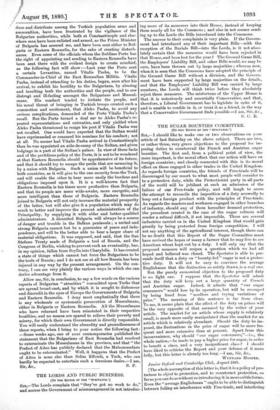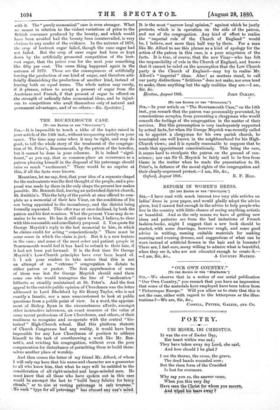• THE SUGAR BOUNTIES COMMITTEE.
(To THE EDITOR OF THE " SPECTATOR:1 should like to make one or two observations on your article of last Saturday on the above subject. There are two, or rather three, very grave objections to the proposal for im- posing duties to countervail the French and Austrian sugar bounties. The first and, from a political point of view, the more important, is the moral effect that our action will have on foreign countries ; and closely connected with this is its moral effect on those engaged in other trades in the United Kingdom. As regards foreign countries, the friends of Free-trade will be discouraged by our resort to what most people will consider to be a protective duty, while the Protectionist party in all parts of the world will be jubilant at such an admission a the failure of our Free-trade policy, and will laugh to scorn the attempt to reconcile the imposition of a duty avowedly to keep out a foreign product with the principles of Free-trade. As regards the masters and workmen engaged in other branches of industry, should any of them hereafter demand protection, the precedent created in the case of the sugar refiners will render a refusal difficult, if not impossible. There are several industries carried on in the United Kingdom that would gain greatly by being protected from foreign competition. I will not say anything of the agricultural interest, though there can be no doubt that this Report of the Sugar Committee must have revived the hopes of many a farmer that he may live to see American wheat kept out by a duty. I will only say that the proposed measure will reopen a question which we had all hoped and believed was closed. The Spectator is able to per- suade itself that a duty on "bounty-fed" sugar is not a protec- tive duty. It will not be easy to convince the average Englishman that the distinction so subtly drawn is a real one.
But the purely economical objection to the proposed duty is no light one. I suppose that the Spectator will admit that the duty will keep out a large quantity of French and Austrian sugar. Indeed, it admits that "our sugar consumers" would lose by its operation, but will be recouped by being freed from "needless and trying variations of price." The meaning of this sentence is far from clear. To me, it seems plain that the effect of the duty on prices will be the very opposite of that assumed by the writer of your article. The market for an article whose supply is relatively small, is much more easily manipulated than the market for an article which is relatively abundant. Should the duty be im- posed, the fluctuations in the price of sugar will be more fre- quent and more extensive than at present. Apart from this inconvenience, why should "our sugar consumers,"—i.e., the whole nation,—be made to pay a higher price for sugar, in order to benefit a class, and a very insignificant class ? I should have liked to criticise the Report and your defence of it more fully, but this letter is already too long.—wI ayminN,ASithi), &c., rza.
Junior Oxford and Cambridge Club, August 24th.
[The whole assumption of this letter is, that it is a policy of pro- tection to object to protection, and to counteract protection, so far as you can do so without re-introducing it in more subtle forms. Even the" average Englishman "ought to be able to distinguish between foiling an interference with Free-trade, and interfering with it. The" purely economical" case is even stronger. What we meant in relation to the violent variations of price to the British consumer produced by the bounty, and which would have been a,voide4 had the bounty been countervailed, is very obvious to any reader of the evidence. In the autumn of 1876, the crop of beetroot sugar failed, though the cane sugar had not failed. But the crop of cane sugar had been so kept down by the artificially promoted competition of the beet- root sugar, that the prices rose for the next year something like fifty per cent. The same thing happened again in the autumn of 1879. These are the consequences of artificially forcing the production of one kind of sugar, and therefore arti- ficially diminishing the production of another kind, instead of leaving both on equal terms. The whole nation may surely, if it pleases, refuse to accept a present of sugar from the Austrians and French, if that present of sugar be offered on -the strength of radically false economical ideas, and be injuri- ous to competitors who avail themselves only of natural and permanent advantages, and of no others.—En. Spectator.1































 Previous page
Previous page